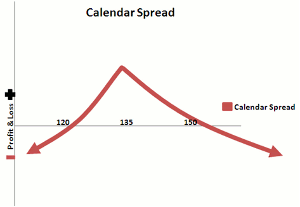If you hate range-bound and low volatility markets, then you may want to try trading a calendar spread, writes the staff at optionalpha.com. But if you’re a beginner you might ask “Is this strategy good for me or will I get burned?”
If you’ve never traded options before, I would stay away for now until you get your feet wet. On the other hand, if you have good understanding of basic options trading principals then calendar spreads could be a useful strategy.
Quick Calendar Spread Basics
As always we need to first identify what a calendar spread is and isn’t.
Calendar spreads are extremely versatile and often are called horizontal or time spreads. As the name implies you are trading different contract months to take advantage of pricing differences between the expiration periods. Aren’t traders just so clever with their names!
Building a calendar spread is very easy (even for beginners)…
The most common spread is built by selling either calls or puts of an option contract with near-term or front-month expiration and then simultaneously purchasing either calls or puts of the same strike price for a further out expiration month.
Since you are purchasing a traditionally more expensive option and selling a cheaper option you’ll usually have a debit on the trade or pay to enter the position overall. Your P/L diagram will look like something similar to the one below with $135 strike price options used as an example.
Calendar Spread Theoretical Profit/Loss Graph
How do you make money, then? Well, now that you are pinned at the same strike you are really not that concerned about the movement in the underlying stock. This is why the strategy works best in range-bound markets.
Instead you want to take advantage of the time decay premiums between the two contract months. The near-term option will have much quicker time decay than the further month option. The idea is to pin-point and capture this difference as a profit and exit the trade before the near-term contract expires.
NEXT PAGE: 5 Important Notes |pagebreak|
For example, the near-term option could lose $50 in time decay value in the next week (since you are short this contract you make a $50 profit). But the further contract that you are long might also lose $35 in time decay. The net is still a gain of $25 but hopefully this helps show you how the position makes money.
5 Important Calendar Spread Notes
As a beginner I want to point out some tips regarding these spreads that are important to trading them successfully:
- How can you lose money? Calendar spreads lose if the underlying moves too far in either direction. The maximum loss is the debit paid, up until the option you sold expires. After that, you are long an option and your further risk is the entire value of that option. This is why these spreads work best in range-bound markets where volatility is stable (or at least not declining).
- Increasing implied volatility helps. As long as volatility is not declining you should be just fine with calendar spreads. In fact, since you are long a more expensive option, higher IV levels will add value to the overall position.
- Have a price target. Just because these work in range-bound markets doesn’t mean you can’t trade them semi-directional. If you have a support/resistance price target, use that to set you strike prices.
- Avoid major earnings or news. We want the underlying to stay “still” until expiration. Earnings or other major company news announcements could send the stock higher/lower quickly so avoid trading within these time frames.
- Cheap the front-month theta premium. Money will be made or loss typically on the front-month option time decay. Before you make the trade check to see if there is even enough premium to be made! For example, if there is only $5 of premium why risk all that money for $5? You get the point.
Overall I think calendar spreads are good for beginners who have traded options before. If you are completely fresh in the options trading world, I suggest you start with something a little simpler (like a traditional credit spread).
Courtesy of optionalpha.com











